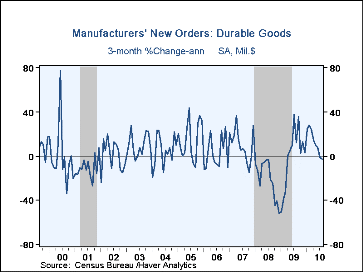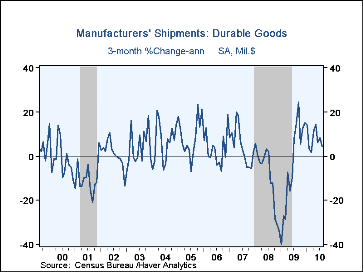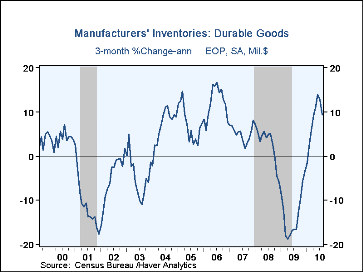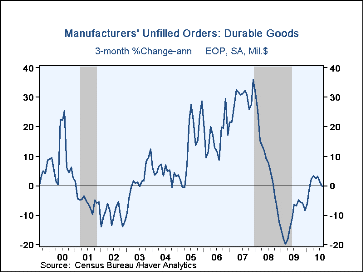 Global| Sep 24 2010
Global| Sep 24 2010U.S. Durable Goods Orders Decline With Fewer Aircraft Bookings
by:Tom Moeller
|in:Economy in Brief
Summary
Following the volatile monthly durable goods numbers can be dizzying. The trend, however, is weakening. The Commerce Department reported that August orders fell 1.3% after an upwardly revised 0.7% July gain. Expectations had been for [...]
Following the volatile monthly durable goods numbers can be dizzying. The trend, however, is weakening. The Commerce Department reported that August orders fell 1.3% after an upwardly revised 0.7% July gain. Expectations had been for a 1.0% decline. But excluding the most volatile transportation industry, orders rose 2.0% after a 2.8% July decline. That beat expectations for a 1.0% rise. The weakening trend is evident in the three-month change in orders which fell 3.0% (AR); excluding transportation, it is off 2.7%.
Leading last month's orders' weakness was a 40.2% decline (+29.5% y/y) in commercial aircraft. A 3.9% rise (24.6% y/y) in machinery orders countered some of that decline, but the three-month change amounted to a negative 8.5%. Electrical equipment orders ticked up 0.5% (8.5% y/y) but three-month growth was a negative 4.6%. On the firm side were orders for computers & related products which rose 3.8% (14.8% y/y) and, on a three-month basis, rose a solid 9.6%. Orders for motor vehicles fell 4.4% (+10.2% y/y) but three-month growth still was a strong 16.5%.
Nondefense capital goods orders also fell 0.9%, lowered by a drop in aircraft. Excluding that decline, orders rose 4.1%. Yet even here, there is signs of slowing with a three-month growth of 8.8%, down from the recent peaks of near 40.0%.
Shipments of durable goods also have weakened, falling 1.5% last month (+8.6% y/y). Moreover, growth of 4.4% during the last three months was down from the 14-24% peaks. Excluding transportation, shipments slipped marginally (+10.1% y/y) last month but the three-month change also was slightly negative. Machinery shipments rose 3.9% and recouped the July decline but three-month growth of 9.0% was down from the 34.6% peak. Computer shipments posted a 2.1% decline but three-month growth held up at 12.5%. Finally, electrical equipment shipments edged up 0.2% and that left three-month growth at a reduced 5.8%.
Weakened inventory accumulation continued behind some of the easing in orders & shipments. Durable goods inventories rose 0.4% (4.1% y/y) but that contrasted with 1.2% increases this spring. The three-month growth eased to 9.3% from the 13.9% peak. Nevertheless, inventories remained roughly 10% below the late-2008 peak. Finally, backlogs of durable goods orders slipped 0.1% for the second month. The three-month growth also was slightly negative.
The durable goods figures are available in Haver's USECON database.
| NAICS Classification(%) | August | July | June | Y/Y | 2009 | 2008 | 2007 |
|---|---|---|---|---|---|---|---|
| Durable Goods Orders | -1.3 | 0.7 | -0.2 | 11.2 | -20.7 | -9.0 | 9.7 |
| Excluding Transportation | 2.0 | -2.8 | 0.2 | 12.9 | -18.4 | -2.5 | 4.5 |
| Nondefense Capital Goods | -0.9 | -0.7 | 1.1 | 21.2 | -26.8 | -12.6 | 17.5 |
| Excluding Aircraft | 4.1 | -5.3 | 3.6 | 19.0 | -19.8 | -4.2 | 5.3 |
Tom Moeller
AuthorMore in Author Profile »Prior to joining Haver Analytics in 2000, Mr. Moeller worked as the Economist at Chancellor Capital Management from 1985 to 1999. There, he developed comprehensive economic forecasts and interpreted economic data for equity and fixed income portfolio managers. Also at Chancellor, Mr. Moeller worked as an equity analyst and was responsible for researching and rating companies in the economically sensitive automobile and housing industries for investment in Chancellor’s equity portfolio. Prior to joining Chancellor, Mr. Moeller was an Economist at Citibank from 1979 to 1984. He also analyzed pricing behavior in the metals industry for the Council on Wage and Price Stability in Washington, D.C. In 1999, Mr. Moeller received the award for most accurate forecast from the Forecasters' Club of New York. From 1990 to 1992 he was President of the New York Association for Business Economists. Mr. Moeller earned an M.B.A. in Finance from Fordham University, where he graduated in 1987. He holds a Bachelor of Arts in Economics from George Washington University.
More Economy in Brief
 Global| Feb 05 2026
Global| Feb 05 2026Charts of the Week: Balanced Policy, Resilient Data and AI Narratives
by:Andrew Cates










